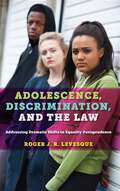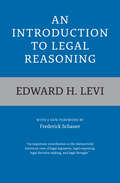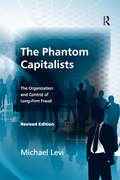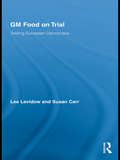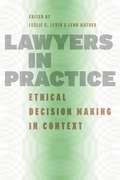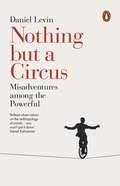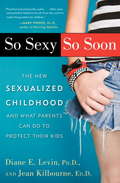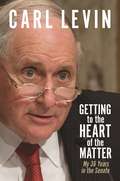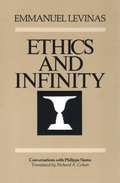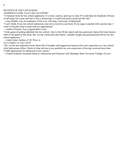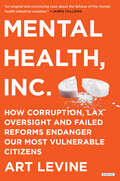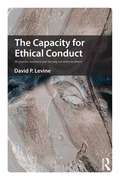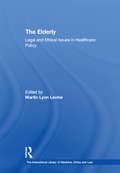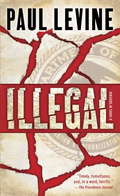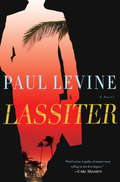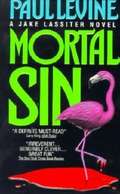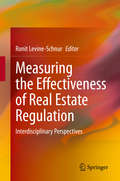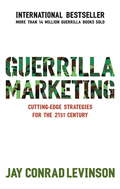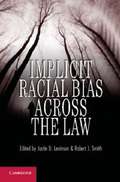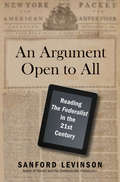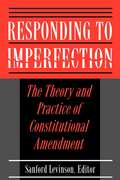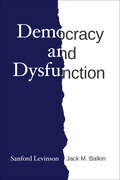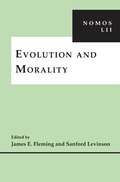- Table View
- List View
Adolescence, Discrimination, and the Law: Addressing Dramatic Shifts in Equality Jurisprudence
by Roger J.R. LevesqueExplores the shifts and the research used to support civil rights claims of discrimination, particularly relating to minority youths’ rights to equal treatment In the wake of the civil rights movement, the legal system dramatically changed its response to discrimination based on race, gender, and other characteristics. It is now showing signs of yet another dramatic shift, as it moves from considering difference to focusing on neutrality. Rather than seeking to counter subjugation through special protections for groups that have been historically (and currently) disadvantaged, the Court now adopts a “colorblind” approach. Equality now means treating everyone the same way. This book explores these shifts and the research used to support civil rights claims, particularly relating to minority youths’ rights to equal treatment. It integrates developmental theory with work on legal equality and discrimination, showing both how the legal system can benefit from new research on development and how the legal system itself can work to address invidious discrimination given its significant influence on adolescents—especially those who are racial minorities—at a key stage in their developmental life. Adolescents, Discrimination, and the Law articulates the need to address discrimination by recognizing and enlisting the law’s inculcative powers in multiple sites subject to legal regulation, ranging from families, schools, health and justice systems to religious and community groups. The legal system may champion ideals of neutrality in the goals it sets itself for treating individuals, but it cannot remain neutral in the values it supports and imparts. This volume shows that despite the shift to a focus on neutrality, the Court can and should effectively foster values supporting equality, especially among youth.
An Introduction to Legal Reasoning
by Edward H. LeviThis volume will be of interest and value to students of logic, ethics, and political philosophy, as well as to members of the legal profession and to everyone concerned with problems of government and jurisprudence. By citing a large number of cases, the author makes his presentation of the processes of judicial interpretation particularly lucid.
The Phantom Capitalists: The Organization and Control of Long-Firm Fraud
by Michael LeviThis book analyzes in detail how and why people become involved in long-firm (planned bankruptcy) fraud, the similarities and differences between long-firm fraud and other crimes, the links between bankruptcy fraudsters and other professional and organized criminals, the techniques that fraudsters use, and the social and commercial relationships that exist within the operational world of the long-firm fraudster. Extensively researched, the study uses interviews with and documentation from businesspeople, credit controllers, lawyers, judges, police, fraud investigators as well as fraudsters themselves. It also makes use of extensive documentary material from contemporary and historical police and court records. Originally published in the 1980s, the revised edition of this seminal work provides a substantial new introduction written by the author to highlight the changing and unchanging relevance of the findings for a contemporary audience, and the ways in which fraud opportunities and the organization of frauds have modified in the intervening years.
GM Food on Trial: Testing European Democracy (Genetics and Society)
by Les Levidow Susan CarrEurope was told that it had no choice but to accept agbiotech, yet this imperative was turned into a test of democratic accountability for societal choices. Since the late 1990s, European public controversy has kept the agri-biotech industry and its promoters on the defensive. As some opponents and regulators alike have declared, ‘GM food/crops are on trial’. Suspicion of their guilt has been evoked by moral symbols, as disputes over whether genetically-modified products are modest benign improvements on traditional plant breeding, or dangerous Frankenfoods; and in disputes over whether they are global saviours, or control agents of multinational companies. This book examines European institutions being ‘put on trial’ for how their regulatory procedures evaluate and regulate GM products, in ways which opened up alternative futures. Levidow and Carr highlight how public controversy created a legitimacy crisis, leading to national policy changes and demands, in turn stimulating changes in EU agbiotech regulations as a strategy to regain legitimacy.
Lawyers in Practice: Ethical Decision Making in Context
by Levin Leslie C. Lynn MatherHow do lawyers resolve ethical dilemmas in the everyday context of their practice? What are the issues that commonly arise, and how do lawyers determine the best ways to resolve them? Until recently, efforts to answer these questions have focused primarily on rules and legal doctrine rather than the real-life situations lawyers face in legal practice. The first book to present empirical research on ethical decision making in a variety of practice contexts, including corporate litigation, securities, immigration, and divorce law, Lawyers in Practice fills a substantial gap in the existing literature. Following an introduction emphasizing the increasing importance of understanding context in the legal profession, contributions focus on ethical dilemmas ranging from relatively narrow ethical issues to broader problems of professionalism, including the prosecutor’s obligation to disclose evidence, the management of conflicts of interest, and loyalty to clients and the court. Each chapter details the resolution of a dilemma from the practitioner’s point of view that is, in turn, set within a particular community of practice. Timely and practical, this book should be required reading for law students as well as students and scholars of law and society.
Nothing but a Circus: Misadventures among the Powerful
by Daniel Levin'Brilliant observations on the anthropology of power. You will laugh aloud and you won't put it down' Daniel KahnemanIn this eye-opening exploration of the human weaknesses for power, Daniel Levin takes us on a hilarious journey through the absurd world of our global elites, drawing unforgettable sketches of some of the puppets who stand guard, and the jugglers and conjurers employed within. Most spectacular of all, however, are the astonishing contortions performed by those closest to the top in order to maintain the illusion of integrity, decency, and public service. Based on the author's first hand experiences of dealing with governments and political institutions around the world, Nothing but a Circus offers a rare glimpse of the conversations that happen behind closed doors, observing the appalling lengths that people go to in order to justify their unscrupulous choices, from Dubai to Luanda, Moscow to Beijing, and at the heart of the UN and the US government.
So Sexy So Soon
by Diane E. Levin Jean KilbourneRisqué Halloween costumes for young girls. T-shirts that boast “Chick Magnet” for toddler boys. Sexy content on almost every television channel, as well as in movies and video games. Popular culture and technology inundate our boys and girls with an onslaught of graphic sexual messages at earlier ages than ever before. Without the emotional sophistication to understand what they are doing and seeing, kids are getting into increasing trouble emotionally and socially. Parents are left shaking their heads, wondering: How did this happen? What can we do? Diane E. Levin, Ph. D. , and Jean Kilbourne, Ed. D. , internationally recognized experts in, respectively, early childhood development and the impact of the media on children and teens, offer parents essential, age-appropriate strategies to counter the assault. Filled with savvy suggestions, helpful sample dialogues, and poignant stories from families dealing with these issues,So Sexy So Soonprovides parents with the information, skills, and confidence they need to discuss sensitive topics openly and effectively–so their kids can just be kids.
Lawyers in Practice: Ethical Decision Making in Context (Chicago Series in Law and Society)
by Leslie C. Levin Lynn MatherHow do lawyers resolve ethical dilemmas in the everyday context of their practice? What are the issues that commonly arise, and how do lawyers determine the best ways to resolve them? Until recently, efforts to answer these questions have focused primarily on rules and legal doctrine rather than the real-life situations lawyers face in legal practice. The first book to present empirical research on ethical decision making in a variety of practice contexts, including corporate litigation, securities, immigration, and divorce law, Lawyers in Practice fills a substantial gap in the existing literature. Following an introduction emphasizing the increasing importance of understanding context in the legal profession, contributions focus on ethical dilemmas ranging from relatively narrow ethical issues to broader problems of professionalism, including the prosecutor’s obligation to disclose evidence, the management of conflicts of interest, and loyalty to clients and the court. Each chapter details the resolution of a dilemma from the practitioner’s point of view that is, in turn, set within a particular community of practice. Timely and practical, this book should be required reading for law students as well as students and scholars of law and society.
Getting to the Heart of the Matter: My 36 Years in the Senate
by Senator Carl LevinRepresenting Michigan for thirty-six years in the U.S. Senate, Carl Levin, the longest-serving senator in Michigan history, was known for his dogged pursuit of the truth, his commitment to holding government accountable, and his basic decency. Getting to the Heart of the Matter: My 36 Years in the Senate is his story – from his early days in Detroit as the son of a respected lawyer to the capstone of his career as chair of both the Senate Armed Services Committee and the Senate Permanent Subcommittee on Investigations. Levin’s career placed him at the center of some of our nation’s most critical points in modern times: from the aftermath of the 1967 Detroit riots, to the Clinton impeachment, through 9/11 and the wars in Iraq and Afghanistan, and the 2008 financial crisis. He met with numerous world leaders, including Egypt’s Anwar Sadat and China’s Jiang Zemin. Getting to the Heart of the Matter recounts Levin’s experiences, thoughts, and actions during these historic moments. Consisting of seventeen chapters, the book takes the reader through Levin’s early life in Detroit of the 1940s, 50s, and 60s where he met his wife, started a family, practiced law and served as the first General Counsel for the newly created Michigan Civil Rights Commission and the chief appellate defender for Detroit’s Legal Aid Office. Elected to the Detroit City Council in 1969, where Levin served for eight years including four as Council president, the book describes how his fight against the Department of Housing and Urban Development’s devastating housing practices in the neighborhoods of Detroit led him to run for the U.S. Senate with a pledge to make government work more effectively. Winning election six times, Levin had an illustrious career in the Senate where he challenged leaders in government and the private sector for the greater good of the nation. Levin describes how, as a Democrat, throughout his time in the Senate, he worked with Republican senators who often held different policy positions in order to find common ground to achieve national goals, and how he and his Senate staff searched for creative solutions to trade issues, support for the auto industry and manufacturing sector, U.S. military action in Iraq and Afghanistan, and efforts to protect the Great Lakes and the environment, among many other issues. Levin’s hope in writing this memoir is that by sharing his deeply held beliefs about the responsibility of elected officials, the book will serve as a resource for people beginning a career in, or contemplating running for, public office. Readers with an interest in politics, history, facts, and perseverance will find kinship in this book.
Ethics and Infinity
by Emmanuel LevinasLevinas brings together the phenomenology of Husserl, the fundamental ontology of Heidegger, and the Bible. This book highlights his modesty and reserve and, above all, his rigor. It is the best introduction to his work. Chapters Include: Bible and Philosophy; Heidegger; The 'There Is'; The Solitude of Being; Love and Filiation; Secrecy and Freedom; Responsibility for the Other; The Glory of Testimony; The Hardness of Philosophy and the Consolations of Religion. Translated from the French by Richard Cohen.
The Law School Decision Game: A Playbook for Prospective Lawyers
by Ann K. LevineWhether you’re considering law school or are already committed, "The Law School Decision Game: A Playbook for Prospective Lawyers" explains your choice to enter the legal profession with the candor readers have come to expect from Ann Levine's Law School Expert blog including: <p><p>•What lawyers do, how much money they make, and how hard they work. <p>•What’s important in choosing a law school. <p>•What BigLaw is really like.•What to consider before taking on student loan debt in today's job market. <p>•What you can do now to increase your likelihood of getting hired later. <p>•What is important in choosing an area of specialization. <p>•What you need to know and do in law school and in the first few years of your career to set yourself up for success.
Mental Health Inc: How Corruption, Lax Oversight, And Failed Reforms Endanger Our Most Vulnerable Citizens
by Art LevineThe no-holds-barred and crucial call to action for America’s broken mental health system, by a prize-winning investigative journalist The mental health system in America is hardly the front-burner issue it should be, despite lip service about reform after each new tragic mass killing. Yet every American should care deeply about fixing a system a presidential commission reported was in “shambles.” By some measures, 20 percent of Americans have some sort of mental health condition, including the most vulnerable among us—veterans, children, the elderly, prisoners, the homeless. With Mental Health, Inc., award-winning investigative journalist Art Levine delivers a Shock Doctrine-style exposé of the failures of our out of control, profit-driven mental health system, with a special emphasis on dangerous residential treatment facilities and the failures of the pharmaceutical industry, including the overdrugging of children with antipsychotics and the disastrous maltreatment of veterans with PTSD by the scandal-wracked VA. Levine provides compelling narrative portraits of victims who needlessly died and some mentally ill people who won unexpected victories in their lives by getting smart, personalized help from “pyschosocial” programs that incorporate safe and appropriate prescribing, along with therapy and social support. He contrasts their stories with corrupt Big Pharma executives and researchers who created fraudulent marketing schemes. Levine also tells the dramatic David vs. Goliath stories of a few brave reformers, including Harvard-trained psychiatrist and researcher Dr. Stefan Kruszewski, who has acted as a whistleblower in several major cases, leading to important federal and state settlements; in addition, the book spotlights pioneering clinicians challenging outmoded, drug-and-sedate practices that leave 90 percent of people with serious mental illness too disabled to work. By taking a comprehensive look at mental health abuses and dangerous, ineffective practices as well as pointing toward solutions for creating a system for effective, proven and compassionate care, Art Levine’s essential Mental Health, Inc. is a call to action for politicians and citizens alike—needed now more than ever.
The Capacity for Ethical Conduct: On psychic existence and the way we relate to others
by David P. LevineWhat is the root cause of ethical failure? Why is preoccupation with ethics more a part of the problem than a part of the solution? What makes ethical conduct a natural expression of who we are? What enables us to be ourselves in our relations with others? Ethical failure has become a significant concern in public life, in organizations and in educational institutions. The Capacity for Ethical Conduct explores how qualities of character and personality either make ethical conduct possible for the individual or foster ethical failure. David Levine discusses how ethical conduct is a special way of relating to others, one that secures respect for their integrity by assuring that what they do can express who they are. He argues that this special way of relating to others results not from knowledge of, or a stated commitment to, rules, norms and values, but from the way we experience ourselves, especially from our ability to make a positive emotional investment in being and having a self. Traditionally, emphasis on the importance of values and ethics in shaping conduct tends to be connected to the need to find fault in self and others, fostering an atmosphere where the self is put at risk in its relations to others. This means that an excessive emphasis on ethics, rather than assuring ethical conduct, tends instead to create interpersonal settings marked by emotional assault. Because of this, talk about ethics often expresses ambivalence about ethical conduct, which makes the familiar combination of preoccupation with ethics and ethical failure unsurprising. The Capacity for Ethical Conduct explores the ways in which the interpersonal world of work either fosters a feeling of safety or encourages various forms of emotional assault. Presenting case studes and applying psychoanalytic object relation theory and self psychology, this book explores the factors underlying ethical failure and the capacity for ethical conduct. It will be of interest to scholars and practioners in the fields of psychoanalysis, psychology, philosophy, sociology, organizational dynamics, management and public administration.
The Elderly: Legal and Ethical Issues in Healthcare Policy (The International Library of Medicine, Ethics and Law)
by Martin Lyon LevineAging is a public health priority that is becoming increasingly important in both developed and less developed nations, with individual health care providers and law-makers each facing difficult ethical and policy dilemmas. The complex issues physicians deal with include informed consent and patient decision-making capacity, use of advance care planning and decision-making by family and medical staff, and withdrawing and withholding life-sustaining interventions. Broader questions include: has aging been over medicalized? Is it ethical for older patients to receive less medical care than younger ones, through unspoken practice or formal rationing? Is there inevitable conflict between the generations over scarce medical resources? How should physician, patient and family confront end-of-life decisions? How have different nations responded to increasing numbers of the elderly? Have social values changed as to family responsibility and individual autonomy? This volume brings together the most significant published essays in the field.
Illegal
by Paul LevineThe Edgar-nominated author acclaimed for clever writing and crackling courtroom scenes delivers a vividly realized thriller about a disgraced lawyer traveling the twisted border between justice and revenge in a desperate bid to clear his name.
Lassiter
by Paul LevineEighteen years ago, Jake Lassiter crossed paths with a teenage runaway who disappeared into South Florida's sex trade. Now he retraces her steps and runs head-on into a conspiracy of Miami's rich and powerful who would do anything to keep the past as dark as night and silent as the grave. In this tale of redemption and revenge, Edgar-nominated author Paul Levine delivers his most powerful thriller yet. Jake Lassiter, second-string linebacker turned low-rent lawyer, is cynical about the law, but if you hire him, he'll take a punch for you . . . and maybe a swing at the prosecutor, too.Amy Larkin--beautiful, angry, and mysterious--accuses Lassiter of involvement in the disappearance of her sister eighteen years earlier. What does Lassiter know about Krista Larkin, the runaway teen turned porn actress? More than he's saying. Seeking to atone for his own past, Lassiter follows the cold trail of the missing Krista and butts head with the powerful men who also knew her: a former porn king turned philanthropist, a slick Cuban-born prosecutor who'd love to be governor, and an aging mobster who once worked for the infamous Meyer Lansky. The evidence leads to a long-ago night of kinky sex, designer drugs--and possible murder. But before Lassiter can nail the truth, a gun goes off, a suspect falls dead, and Amy is charged with murder.The state has an eyewitness and a slam-dunk case. Lassiter has a client he doesn't trust and a case he can't win. Did Amy shoot the man who killed her sister? Or the wrong man? And what really happened to Krista? The answers, buried under years of deceit and corruption, are revealed in an explosive courtroom finale proving that rough justice is better than no justice at all.From the Hardcover edition.
Mortal Sin
by Paul LevineA dazzling new mystery series set in sizzling Miami featuring a former football player turned lawyer/investigator. When Jake Lassiter uncovers a ruthless scheme to destroy the Everglades, he soon finds himself face to face with trouble, mayhem and alligators. The Jake Lassiter character has been optioned for development as an NBC-TV Mystery Movie.
Measuring the Effectiveness of Real Estate Regulation: Interdisciplinary Perspectives
by Ronit Levine-SchnurThis book discusses the fundamental issues regarding the effect of real estate regulation on housing, urban development, and considerations of justice and efficiency. Bringing together the contributions of prominent scholars representing diverse methodologies and academic disciplines, this book offers new perspectives on core topics such as the effectiveness of land use regulation in terms of housing availability, enhanced equality, and sustainable development; and different modes of regulation and their mutual influences. The book’s eleven chapters are divided into five parts which address different aspects of real estate regulation, combining theoretical analysis with a close observation of diverse case studies, from North America and Europe to China, the Middle East, and developing economies. Part I offers cutting-edge analysis on how to measure, model, and understand the impact of zoning and other modes of real estate regulation, from economic and normative theoretical viewpoints. Part II complements Part I by providing historical observations and empirical knowledge on the actual contribution of zoning and historical conservation regulation to cities’ shape. Part III considers the outcomes of business and industrial land development policies. Part IV studies urban land development regulation and allows to compare between two relevant case studies—one from Germany, and the other from Poland. Finally, Part V concerns standardization in the real estate market by analyzing the justification and outcomes of such attempts, particularly in the mortgages market. Providing an interface between theory and practice, the book will appeal to a broad audience, consisting of scholars, policy-makers, practitioners, and students, interested in an interdisciplinary overlook on real estate regulation.
Guerrilla Marketing: Cutting-edge strategies for the 21st century
by Jay LevinsonThe book every small-business owner should ownFirst published in 1983, Jay Levinson's Guerrilla Marketing has become a classic in the field of business, revolutionising marketing for small businesses all over the world and creating a new way to understand market share and how to gain it. In this completely updated and expanded fourth edition of Levinson's first Guerrilla Marketing book, his take-no-prisoners approach to finding clients is on full display, as he offers hundreds of marketing ideas that really work and a new roadmap for small-business success in the global marketplace. Filled with leading-edge strategies for marketing on the Internet, putting new technologies to work, targeting prospects, cultivating repeat and referral business, and managing in the age of telecommuting and freelance employees, among others, Guerrilla Marketing will be the entrepreneur's marketing bible for the twenty-first century.
Implicit Racial Bias across the Law
by Justin D. Levinson Robert J. SmithDespite cultural progress in reducing overt acts of racism, stark racial disparities continue to define American life. This book is for anyone who wonders why race still matters and is interested in what emerging social science can contribute to the discussion. The book explores how scientific evidence on the human mind might help to explain why racial equality is so elusive. This new evidence reveals how human mental machinery can be skewed by lurking stereotypes, often bending to accommodate hidden biases reinforced by years of social learning. Through the lens of these powerful and pervasive implicit racial attitudes and stereotypes, Implicit Bias across the Law examines both the continued subordination of historically disadvantaged groups and the legal system's complicity in the subordination.
An Argument Open to All
by Sanford LevinsonIn "An Argument Open to All, " renowned legal scholar Sanford Levinson takes a novel approach to what is perhaps America's most famous political tract. Rather than concern himself with the authors as historical figures, or how "The Federalist" helps us understand the original intent of the framers of the Constitution, Levinson examines each essay for the "political" wisdom it can offer us today. In eighty-five short essays, each keyed to a different essay in "The Federalist, " he considers such questions as whether present generations can rethink their constitutional arrangements; how much effort we should exert to preserve America's traditional culture; and whether "The Federalist"'s arguments even suggest the desirability of world government. "
Constitutional Faith
by Sanford LevinsonThis book examines the "constitutional faith" that has, since 1788, been a central component of American "civil religion." By taking seriously the parallel between wholehearted acceptance of the Constitution and religious faith, Sanford Levinson opens up a host of intriguing questions about what it means to be American. While some view the Constitution as the central component of an American religion that serves to unite the social order, Levinson maintains that its sacred role can result in conflict, fragmentation, and even war. To Levinson, the Constitution's value lies in the realm of the discourse it sustains: a uniquely American form of political rhetoric that allows citizens to grapple with every important public issue imaginable. In a new afterword, Levinson looks at the deepening of constitutional worship and attributes the current widespread frustrations with the government to the static nature of the Constitution.
Responding to Imperfection: The Theory and Practice of Constitutional Amendment
by Sanford LevinsonAn increasing number of constitutional theorists, within both the legal academy and university departments of government, are focusing on the conceptual and political problems attached to the notion of constitutional amendment. Amendments are, among other things, recognitions of the imperfection of existing schemes of government. The relative ease or difficulty of amendment has significant implications for the ways that governments respond to problems that call either for new structures of governance or new powers for already established structures. This book brings together essays by leading legal authorities and political scientists on a range of questions from whether the U.S. Constitution is subject to amendment by procedures other than those authorized by Article V to how significant change is conceptualized within classical rabbinic Judaism. Though the essays are concerned for the most part with the American experience, other constitutional traditions are considered as well. The contributors include Bruce Ackerman, Akhil Reed Amar, Mark E. Brandon, David R. Dow, Stephen M. Griffin, Stephen Holmes and Cass R. Sunstein, Sanford Levinson, Donald Lutz, Walter Murphy, Frederick Schauer, John R. Vile, and Noam J. Zohar.
Democracy and Dysfunction
by Sanford Levinson Jack M. BalkinIt is no longer controversial that the American political system has become deeply dysfunctional. Today, only slightly more than a quarter of Americans believe the country is heading in the right direction, while sixty-three percent believe we are on a downward slope. The top twenty words used to describe the past year include “chaotic,” “turbulent,” and “disastrous.” Donald Trump’s improbable rise to power and his 2016 Electoral College victory placed America’s political dysfunction in an especially troubling light, but given the extreme polarization of contemporary politics, the outlook would have been grim even if Hillary Clinton had won. The greatest upset in American presidential history is only a symptom of deeper problems of political culture and constitutional design. Democracy and Dysfunction brings together two of the leading constitutional law scholars of our time, Sanford Levinson and Jack M. Balkin, in an urgently needed conversation that seeks to uncover the underlying causes of our current crisis and their meaning for American democracy. In a series of letters exchanged over a period of two years, Levinson and Balkin travel—along with the rest of the country—through the convulsions of the 2016 election and Trump’s first year in office. They disagree about the scope of the crisis and the remedy required. Levinson believes that our Constitution is fundamentally defective and argues for a new constitutional convention, while Balkin, who believes we are suffering from constitutional rot, argues that there are less radical solutions. As it becomes dangerously clear that Americans—and the world—will be living with the consequences of this pivotal period for many years to come, it is imperative that we understand how we got here—and how we might forestall the next demagogue who will seek to beguile the American public.
Evolution and Morality: NOMOS LII (NOMOS - American Society for Political and Legal Philosophy #6)
by Sanford Levinson James E. FlemingCan theories of evolution explain the development of our capacity for moral judgment and the content of morality itself? If bad behavior punished by the criminal law is attributable to physical causes, rather than being intentional or voluntary as traditionally assumed, what are the implications for rethinking the criminal justice system? Is evolutionary theory and "nature talk," at least as practiced to date, inherently conservative and resistant to progressive and feminist proposals for social changes to counter subordination and secure equality? In Evolution and Morality, a group of contributors from philosophy, law, political science, history, and genetics address many of the philosophical, legal, and political issues raised by such questions. This insightful interdisciplinary volume examines the possibilities of a naturalistic ethics, the implications of behavioral morality for reform of the criminal law, the prospects for a biopolitical science, and the relationship between nature, culture, and social engineering.
